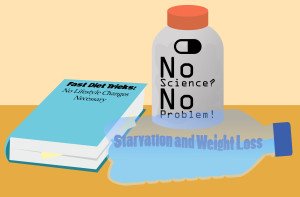As Seen on TV: Crazy Diet Trends
 You’ve seen it on TV. The results are amazing, a breakthrough, nothing short of miraculous. But should you part with your money and try what seems to be too good to be true? If it sounds too good to be true, it probably is. In fact, many of these diet plans are downright harmful -- keeping calories and nutrients so low that your body burns muscle right along with fat. And those supplements… well, you can't know for sure what’s really in them, since those manufacturers don’t have to follow the same rules as food or drug manufacturers. Don’t waste your money or put your health at risk before getting the lowdown on these popular programs.The Plan: SensaThe Claim: Losing weight is as simple as sprinkling a tasteless powder on your food. You don’t need to change your diet, count calories, or do anything else differently. Sensa works with your sense of smell to trick you into feeling full.The Scoop: The only evidence of Sensa’s effectiveness comes from the company itself. No research has been published in a peer-reviewed journal.The Plan: The Master Cleanse Diet (aka Lemonade Diet)The Claim: This 10-day cleansing diet will rid your body of toxins and about 10-20 pounds.The Scoop: The only food you are allowed is a drink you make yourself from water, real maple syrup, lemon juice, and cayenne pepper. Plus, you have to take nightly laxatives. Over the course of a day, you will consume just 500-800 calories, which is the reason for the weight loss. The diet results in inadequate nutrition and loss of lean body mass. The laxatives are not necessary to detoxify your body, but they could result in the loss of good-for-you bacteria in your intestines.The Plan: Wheat Belly DietThe Claim: Eliminating wheat is the holy grail of weight loss.The Scoop: The diet described in this book is a low-carbohydrate diet. These diets tend to result in more rapid initial weight loss when compared to other diets. However, they do not result in greater weight loss over time. Giving up wheat could lead to either a more healthful diet or a poor diet, depending on the foods replacing wheat products. For example, if you trade wheat-containing junk foods like cookies for wheat-free varieties, your diet has not improved. If you trade those foods for fruits and vegetables, you will have a more healthful diet and will likely consume fewer calories, which will then cause weight loss. You’re better off eating fruits, vegetables, and whole grains.By Jill Weisenberger, MS, RD, CDE
You’ve seen it on TV. The results are amazing, a breakthrough, nothing short of miraculous. But should you part with your money and try what seems to be too good to be true? If it sounds too good to be true, it probably is. In fact, many of these diet plans are downright harmful -- keeping calories and nutrients so low that your body burns muscle right along with fat. And those supplements… well, you can't know for sure what’s really in them, since those manufacturers don’t have to follow the same rules as food or drug manufacturers. Don’t waste your money or put your health at risk before getting the lowdown on these popular programs.The Plan: SensaThe Claim: Losing weight is as simple as sprinkling a tasteless powder on your food. You don’t need to change your diet, count calories, or do anything else differently. Sensa works with your sense of smell to trick you into feeling full.The Scoop: The only evidence of Sensa’s effectiveness comes from the company itself. No research has been published in a peer-reviewed journal.The Plan: The Master Cleanse Diet (aka Lemonade Diet)The Claim: This 10-day cleansing diet will rid your body of toxins and about 10-20 pounds.The Scoop: The only food you are allowed is a drink you make yourself from water, real maple syrup, lemon juice, and cayenne pepper. Plus, you have to take nightly laxatives. Over the course of a day, you will consume just 500-800 calories, which is the reason for the weight loss. The diet results in inadequate nutrition and loss of lean body mass. The laxatives are not necessary to detoxify your body, but they could result in the loss of good-for-you bacteria in your intestines.The Plan: Wheat Belly DietThe Claim: Eliminating wheat is the holy grail of weight loss.The Scoop: The diet described in this book is a low-carbohydrate diet. These diets tend to result in more rapid initial weight loss when compared to other diets. However, they do not result in greater weight loss over time. Giving up wheat could lead to either a more healthful diet or a poor diet, depending on the foods replacing wheat products. For example, if you trade wheat-containing junk foods like cookies for wheat-free varieties, your diet has not improved. If you trade those foods for fruits and vegetables, you will have a more healthful diet and will likely consume fewer calories, which will then cause weight loss. You’re better off eating fruits, vegetables, and whole grains.By Jill Weisenberger, MS, RD, CDE


